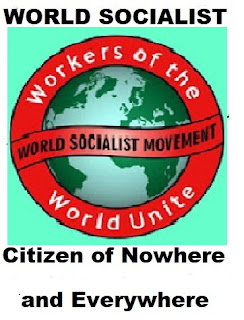The Socialist Party visualised socialism as based on the common ownership of the means of production and distribution, a new economic system built upon raising production to a higher level and ending all social oppression by dissolving the hostile classes into a community of free and equal producers striving not for sectional interests, but for the common good. This socialist commonwealth will liberate the individual from all economic, political and social oppression and will provide the basis for real freedom and for the full and harmonious development of the individual, giving full scope for the growth of the creative faculties of the mind.
The experiences of the Soviet Union have revealed to us the grave innate dangers of State capitalism which concentrates an overwhelming power in the hands of the government and places the citizen completely at the mercy of the State bureaucrat. The State, as the owner of industry, agriculture and transport become the universal employer, the universal landlord. It controls everything on which the fate and happiness of the individual citizen depend. The citizen is dependent on the State as regards employment, housing, and leisure. This enormous power of the State over the individual citizen leads to a dictatorship. State capitalism does not yet solve any of the outstanding problems confronting workers. It does not abolish crises, the classes, the wage system. Under State capitalism, there is production of commodities for sale, not production for use. Between production and consumption there still remains the barrier of exchange. Therein lies the chief danger of State capitalism.
The distinction between socialist and capitalist society is to be found in the characteristic relations of production, in the ordering of social priorities, and in its whole way of life. The prerequisite for this is the replacement of production for profit with production for use. Socialism will be the extension of a socialised process of production into socialised ownership. Products socially produced by the workers must be owned by the people. Then there will be no barrier to restricting production. Production is no longer guided by profit of the handful of owners but by the requirements of the workers, who now own the means of production. This is production for use and not for profit, the productive forces are released to serve people’s requirements. The economic crisis is abolished because its cause is destroyed. This is the basis for socialism.
The word “socialism” is used as a political trick. The Left call themselves “socialist” and that nationalised industries are socialist, The Right suggests that countries with large welfare programmes are socialist. These have nothing to do with socialism. Many people are against war, for social justice, and for an ecologically sustainable society that capitalism can only create a world of war, injustice and environmental destruction. There is a growing understanding that the current society cannot continue without catastrophe occurring yet we lack a vision of what might replace it. We need to create a world in which socially-validated needs form the basis of production and distribution and focus more on sustainability and sociability.
Capitalism is a world in which production is conducted and driven on a commodity basis which means that workers sell their labour power to producers (who then trade with each other and with “consumers” to get exchange value back with which to buy more labour power and more physical inputs) by tends to recreate capitalism either in its state capitalist form (which some called socialism) or its free-market capitalist form. In socialism, no one will need to, nor be able to, sell their labour power. This is the minimum criterion for a society based on socially-validated needs, since selling one’s labour power makes it (and its products) into commodities with exchange value. People will nonetheless work, not out of a need to get paid in order to live, but because we are able to re-design work so we will enjoy much of it. Socialism is about giving a decent living standard to everybody.
It is hard to say much more about what the working class in power will choose to produce. A world of democratic freedom means decisions that may be hard to predict. Once we have gotten away from the capitalism-driven need to produce and consume in order to make profits we will be able to re-shape our world in profound ways. If wars are largely caused by capitalism and its needs, as the Socialist Party holds, then we no will longer need to engage in the vast amount of human labour spent on war and preparation for war, and this can give more of us more resources to devote to the common good. If we can reorganise our lives around producing for use rather than producing commodities to exchange, we can get away from a culture of competition and compulsive consumption and start to build a society of harmony.




